Inaugurating Conference on Ethics in the New Millennium at Tumkur University
22/12/2014 16:46 (GMT+7) Font size:  
Tumkur, Karnataka, India 21 December 2014 - When His Holiness the Dalai Lama arrived in Bangalore yesterday after a comfortable flight from Delhi the road to his hotel was lined with Tibetans eager to catch a glimpse of their spiritual leader. This morning too they lined the street in the warm sunshine, katags, flowers and incense in their hands and smiles on their faces, to see him off. A drive of about 70kms brought him to Tumkur University for his third visit. This time he was invited to lead the inauguration of a conference on the theme ‘Ethics in a New Millennium; Buddhist Perspectives’, which is being held as part of the fruitful ongoing collaboration between Tumkur University and Sera Jey Monastic University.
Tumkur Vice Chancellor Prof. A.H. Rajasab, the Registrar and Abbots of Tibetan monasteries received His Holiness as he arrived. They invited him to plant a ceremonial bodhi tree opposite the University entrance. With the assistance of centenarian Sree Shivakumara Mahaswamiji, he duly planted and watered it. 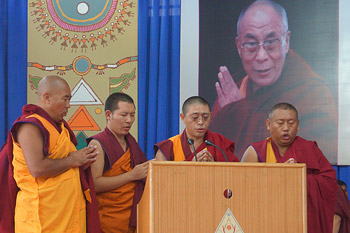
| Monks from Sera Jey Monastery chanting an invocation at the start of the inauguration of a conference on Ethics in the New Millennium at Tumkur University in Tumkur, Karnataka, India on December 21, 2014. Photo/Jeremy Russell/OHHDL
|
On the stage within the University, monks of Sera Jey chanted an invocation. The Vice Chancellor welcomed all the guests and bouquets and garlands were presented to His Holiness and Sree Shivakumara Mahaswamiji. The moderator reminded all those present of the memoir of understanding that exists between Tumkur University and Sera Jey Monastic University and that they have already conducted several events with each other focussing on Prakrit, Pali and Buddhist studies. This conference on ‘Ethics in a New Millennium’ is part of that series. He invited His Holiness to join with the other guests in inaugurating the event by lighting the ceremonial lamp. This was followed by the release of a book containing the conference proceedings.
Two Ministers in the Karnataka Government, TB Jayachandra and H Anjaneya addressed the assembly in Kannada. Then the moderator called on His Holiness to offer the keynote address.
“Brothers and sisters,” he began. “I’m extremely happy to be here once more. And I’m very glad to have the opportunity of meeting Swami-ji here again too. He’s already well over 100 years old and meeting him has spurred my own determination to live for 100 years. It’s wonderful that you have organized this conference.
“I have little interest in formality, I think of myself as just another of the 7 billion human beings. We are social animals and we depend on each other. Due to factors like climate change, it has become urgent that we think about the welfare of humanity.
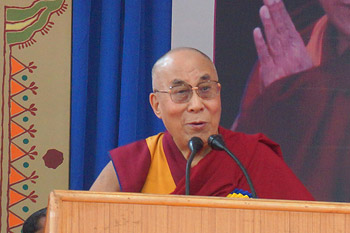 | | His Holiness the Dalai Lama speaking at the inauguration of a conference on Ethics in the New Millennium at Tumkur University in Tumkur, Karnataka, India on December 21, 2014. Photo/Jeremy Russell/OHHDL |
“Material development is important, but it only provides physical comfort. Scientists are increasingly finding evidence to show that peace of mind is instrumental in good health. Families that are moved by kindness, whether they are rich or poor, are happy, whereas a family that is rich but lacking in kindness and affection is unhappy.”
He repeated that material development is all well and good, but that by itself it doesn’t make us happy. In fact it can provoke greed, jealousy, competition and stress. It can be a source of violence. This, he said, is why we need to educate people about inner values. No matter how wonderful, no single religion will satisfy all 7 billion human beings. One billion of them claim to be non-believers, while among believers are many who are insincere, who, lacking real conviction, only pay lip service to their faith.
“Everywhere we see corruption growing like a cancer throughout the world. Then there is the gap between rich and poor; too many people thinking only of themselves and not enough about others. All our religious traditions convey a sense of ethics, of moral principles. However, this country has long adopted a secular approach, secular in the sense of expressing respect for all religious traditions and even for those who adhere to none. This is an approach that is very relevant today. We need to work out how to introduce ethics into our modern secular education system.
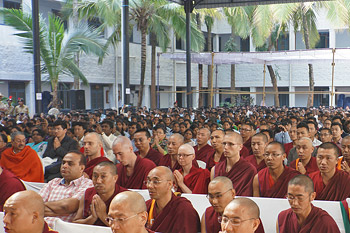
| Monks and students listening to His Holiness the Dalai Lama speaking at Tumkur University in Tumkur, Karnataka, India on December 21, 2014. Photo/Jeremy Russell/OHHDL
|
“On a secondary level, I am a Buddhist, but I am convinced that all the major religious traditions convey a common message of love, tolerance, forgiveness, contentment and self-discipline. Yes, we have our philosophical differences, but at root they are all focussed on the same goal. We need a variety of religious traditions and this country, India, is unique in demonstrating that it is possible for all these traditions to exist together side by side in harmony.”
His Holiness mentioned that he is also a Tibetan, keenly aware of the pure Nalanda tradition introduced to Tibet in the 8th century by Shantarakshita and preserved there. He recalled that he often remarks that Tibetans regarded Indians as their gurus, considering themselves as students or chelas. But, he said, they have proved to be reliable students, because while the traditions of Nalanda University have faced ups and downs in India, they have been kept alive in Tibet. The Nalanda masters left us profound explanations of the workings of the mind and emotions, an advanced psychology which could be very useful if made more widely available today. Similarly, it seems that there are close correspondences between Madhyamaka philosophy and the thinking of Quantum Physics.
His Holiness invited questions from the audience and the first asked about conversion in the Buddhist tradition. His Holiness replied that since the Vinaya is quite clear that a teacher should not teach unless asked to do so, there is no question of asking people to change their faith. However, Dr Ambedkar worked against caste discrimination and his conversion to Buddhism was consistent with that. His Holiness said that as a Buddhist he was full of admiration for Dr Ambedkar’s determination.
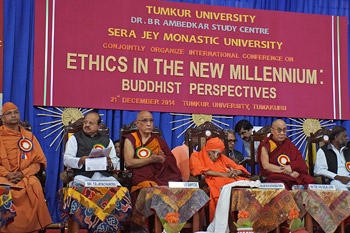
| His Holiness the Dalai Lama and special guests onstage during the inauguration of a conference on Ethics in the New Millennium at Tumkur University in Tumkur, Karnataka, India on December 21, 2014. Photo/Jeremy Russell/OHHDL
|
A second question concerned climate change and His Holiness said that as it increases and the population continues to grow we are beginning to realise that this planet is our only home and that we have to take care of it. Regarding his ambitions, His Holiness said that he looks forward to the world becoming a happier more peaceful place, but doesn’t expect to live to see it. However, he hopes that the generations who belong to the 21st century, by beginning now, may in the long run make the world a better place.
Asked how we can keep peace within when there is so much violence in the world, His Holiness reminded his listeners of the great affection we all experience as infants, which we tend to forget about later. He suggested that we make greater efforts to keep that sense of affection alive. Finally, invited to give a message to young people today, he said:
“Help others. Bring happiness to other people. If that’s difficult, at least don’t do them harm.”
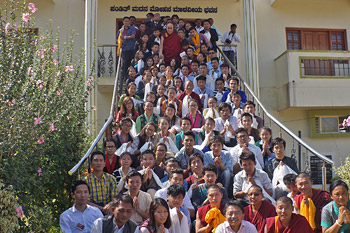
| His Holiness the Dalai Lama with students belonging to the Tibetan Science Society during his visit to Tumkur University in Tumkur, Karnataka, India on December 21, 2014.
Photo/Jeremy Russell/OHHDL
|
After lunch, as the guest of Tumkur University at the Madan Mohan Malviya Guest House, students belonging to the Tibetan Science Society, who had just held their biennial meeting, came to see him. He told them their society was important and they should try to meet every year. He stressed that there is a great need today for a combination of the good qualities of modern and traditional modes of education. He said modern science is based on research and experiment and that this is consistent with the Buddha’s advice to his followers not to accept what he said on the basis of blind faith. He encouraged them to investigate and analyse his words, to use logic and reasoning to reach a conclusion. His Holiness told the students he was prepared to help and support the Science Society if and when they need it.
Leaving Tumkur, His Holiness drove to Davangere, where he stopped for the night. Tomorrow morning he will complete the journey to Mundgod Tibetan Settlement where he will resume his teaching of the texts of the Stages of the Path to Enlightenment at Gaden Jangtse Monastery.  http://www.dalailama.com/
|